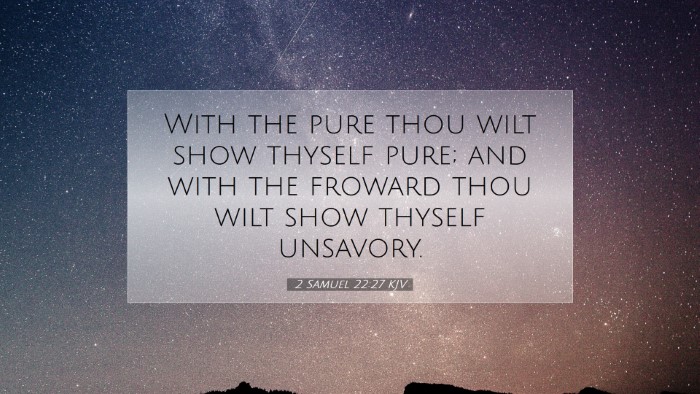Commentary on 2 Samuel 22:27
Bible Verse: "With the pure thou wilt show thyself pure; and with the froward thou wilt show thyself unsavory." - 2 Samuel 22:27
Introduction
This verse is part of David’s song of praise to the Lord after His deliverance from various enemies, reflecting the character of God in His dealings with humanity. The passage encapsulates significant theological themes regarding divine justice and the moral order established by God.
Theological Insights
- The Nature of God’s Justice:
David contrasts the behavior of the pure with that of the froward (or perverse). The commentary by Matthew Henry emphasizes that God's responses are directly aligned with human conduct. He purifies the pure and deals harshly with the morally corrupt.
- God’s Relationship with Humanity:
Albert Barnes highlights that God reveals Himself to individuals according to their character. The pure-hearted receive God's favor and blessings, while the froward become objects of His disapproval.
- Moral Implications:
Adam Clarke interprets this verse as illustrating the universal principle that one reaps what they sow. A pure heart leads to a pure understanding of God, whereas a froward spirit results in misunderstandings and misrepresentations of God's nature.
Verse Breakdown
To grasp the meaning of this passage fully, we can divide it into its two main components: the pure and the froward.
1. The Pure
The term "pure" refers to those who are sincere, clean, and untainted by sin. They seek God wholeheartedly. Matthew Henry notes that such individuals are not free from faults but are committed to living according to God’s commands. Their purity enables them to discern God’s will and experience His guidance.
2. The Froward
In contrast, the "froward" describes those who are rebellious, deceitful, and morally crooked. Clarke points out that God’s revelation to them is just, meaning that they will not experience His grace and favor but rather His judgment and discipline.
Contextual Analysis
This verse fits within a larger context where David reflects on God’s deliverance in times of trouble. Commentators like Barnes suggest that the entire psalm highlights God's faithfulness despite the challenges faced by David. The duality of God’s interaction with the pure and the froward underscores a broader biblical theme of proportionality in divine response.
Application for Believers
The message contained in 2 Samuel 22:27 is profoundly applicable for believers today.
- Personal Holiness: The verse serves as a reminder that believers must strive for purity in their lives. Emphasizing the importance of living a life aligned with God’s will can cultivate a deeper relationship with Him.
- Understanding God’s Ways: Believers can take comfort in knowing that understanding God is influenced by their own walk with Him. A sincere approach to God invites His revelation, while a froward heart distances one from Him.
- Encouragement in Trials: Much like David, believers can be assured that God’s deliverance is near the pure-hearted, encouraging faith during difficult seasons.
Conclusion
In conclusion, 2 Samuel 22:27 serves as a powerful statement about God's character and the nature of His justice. Through the insights gathered from notable public domain commentaries, we see a multifaceted view of how God interacts with humanity based on their moral standing. Pastors, students, theologians, and Bible scholars are reminded through this verse of the vital importance of purity in their relationship with God and encourage them towards a life that embodies sincerity and faithfulness.


